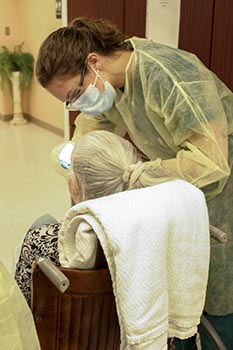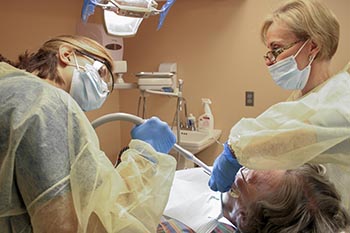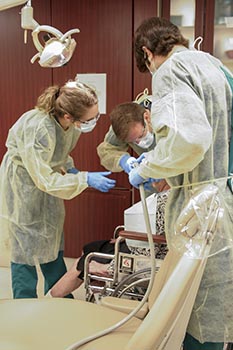In operating Alabama’s only retirement community-based dental clinic, the University of Alabama at Birmingham (UAB) School of Dentistry serves a growing population of people for whom getting dental care poses serious challenges.
 Lillian Mitchell, D.D.S., and the dental students that work in the Fair Haven Retirement Community clinic in Birmingham provide services residents would otherwise have to leave the facility to receive, but leaving can be an impossible task for many of the clinic’s patients.
Lillian Mitchell, D.D.S., and the dental students that work in the Fair Haven Retirement Community clinic in Birmingham provide services residents would otherwise have to leave the facility to receive, but leaving can be an impossible task for many of the clinic’s patients.
“It can be very difficult for patients in this age bracket to receive dental care due to their compromised functional status,” Mitchell said. “They often cannot be transported to an office. If they can be, frequently the office is not equipped to treat someone in a wheelchair or who has a severe cognitive dysfunction like Alzheimer’s disease or advanced dementia. Some nursing home residents are bed-bound, which precludes their transfer to an office.”
Mitchell said dental practitioners with busy offices often want to help, but the time commitment required to care for this population makes it difficult for them to leave their offices and see a patient in a nursing home. Some assisted living residents also find that the high costs of transportation to outside offices are beyond their restricted budgets, so having onsite dental services is a true benefit.
“If they can come to the clinic, we see them here,” Mitchell said. “For those patients who can’t be transported, we will do beside consults.”
The full-service clinic, which exists through a collaborative effort supported by Fair Haven Retirement Community, UAB School of Dentistry, a grant from the Community Foundation of Greater Birmingham and Henry Schein Dental, provides radiographs, extractions, fillings, dentures, partial dentures and crowns. The clinic also repairs existing prostheses and is able to manage and maintain implants.
Today, about 1.3 million older Americans live in nursing homes. According to the U.S. Administration on Aging, the population of Americans older than 65 years is expected to double to about 71 million by 2040, and research estimates that more than 40 percent of people over the age of 65 will reside at a nursing home at some point in their lives.
“This is important work because the vulnerable older adult population is the fastest growing segment of our population; these people are maintaining their teeth longer and will need oral care,” Mitchell said.
 Patients are not the only ones who benefit from the clinic.
Patients are not the only ones who benefit from the clinic.
“Our students need to know how to take care of the older adult; one in four of their patients will be over the age of 65 in the next 20 to 30 years,” Mitchell said. “This clinic provides access to care for the complex older adult and serves as a wonderful oral health care learning environment for many health professions trainees, especially the dental students whose careers will be impacted by this cohort of patients.”
Students also have the opportunity to interact with medical personnel including geriatricians, nurses, CNA’s and dieticians, as well as caregivers, and they contribute to the interprofessional, holistic care of these vulnerable adults.
As people live longer and retain more natural teeth, the complexity of their dental treatment increases. Geriatric dentistry includes diagnosing, treating and preventing cavities and periodontal disease, just like patients of all ages. It also includes oral mucosal diseases, dry mouth caused by medications, salivary dysfunction and impaired chewing, tasting and swallowing that can come with aging.
Treatment and prevention has broad health implications.
 “We know oral health is linked to diabetes, heart disease, stroke and dementias,” Mitchell said. “Also, in the nursing home setting, rates are high for aspiration pneumonia, and oral health has been directly linked to this as well.”
“We know oral health is linked to diabetes, heart disease, stroke and dementias,” Mitchell said. “Also, in the nursing home setting, rates are high for aspiration pneumonia, and oral health has been directly linked to this as well.”
There has been a decrease in aspiration pneumonia rates at Fair Haven.
“I truly feel it’s because we are seeing patients regularly,” Mitchell said. “If we can take care of residents’ dental needs, we are not only impacting their quality of life; we’re likely impacting their longevity as well.”
Mitchell started the clinic at Fair Haven as a pilot project in 2010 with no funding. The students brought their own instruments, and Mitchell purchased spin brushes and toothpaste at Wal-Mart on her way to the sessions. They provided oral cancer screenings along with thorough oral examinations, oral hygiene services, teeth and denture cleanings.
“The need was so great for consistent dental care in this population that it could not be ignored,” she said.
Mitchell has also worked with Fair Haven staff on how to help residents with daily dental care, as well as on what to look for in patients who may have dental issues.
Working with retirement community residents is not without its challenges and often requires creativity. Sometimes it is safer and easier to leave a patient in their wheelchair and perform the work next to the dental chair and its equipment.
“This population of older adults and their dental issues will stretch the skills of even the most seasoned practitioner,” Mitchell said. “Especially for patients with dementias or other issues, the students learn to think out of the box to get the job done every day they are in the clinic, and they go the extra mile in talking to them and helping make them comfortable while they are with us.”
Mitchell said she would eventually like to expand and be able to accept patients from the community and other retirement facilities.
“Community physicians, families and other facilities contact us every week requesting care for an older adult, but we are not in a position at this time to travel and take our services on the road,” she said. “However, Fair Haven is working on the zoning as part of their building plans. We hope that will come to fruition and allow us to see outside patients.”